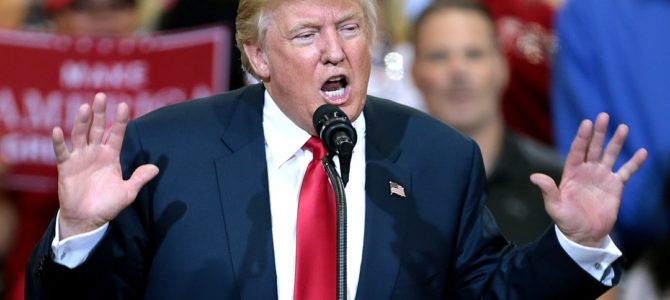
On Wednesday, President Trump took to Twitter and… well, this is a set-up that means something amusing or concerning happened, and not much in-between. Anyway, the president of the United States called his NeverTrump opposition “human scum.” Suffice to say, I do not endorse this characterization. But I’m utterly mystified by those who insist on another national struggle session over the president’s rhetoric because of their misplaced belief that D.C. was all curtsies and decorum before Trump showed up.
Let me explain: A friend of mine, who had a reasonably important White House job in a different administration, is fond of saying, “The problem with Washington is there are not enough bar fights.”
It’s very, very true that so much of what passes for “civility” in the center-left consensus in This Town is anything but. Official Washington Civility™ is more often than not a cloak for the backstabbing petty “Mean Girls” nonsense that’s really going on over lunch at The Palm or in, yes, literal cloakrooms. We even have things like the White House Correspondents Dinner that could almost pass for religious rites dedicated to worshiping this false “civility” god.
When people resort to fisticuffs, the dispute is at least out in the open. The truth is we would probably get more done and have more ultimate agreement if everyone was clear about what they really think so we could have real arguments that acknowledge what everyone feels and knows but can’t say for one reason or another.
And because media and major institutions all lean left and apply most of the pressure in civil society, it tends to be one group of people disproportionately biting their lips. Those same people snapped in 2016.
Why did they snap? Well, Barack Obama was a well-spoken, generally nice guy. He also sued nuns to make them pay for abortions. Everyone in his orbit spent months in 2012 calling Mitt Romney — Mitt Romney! — a racist felon who gave people cancer. Obama brought a mobbed-up Chicago banker to the White House and emphatically endorsed that mobbed-up banker’s run for his old Senate seat. He made excuses for the Internal Revenue Service going after his political enemies. He lied repeatedly about health care. He gave cash to terrorists and guns to cartels, and his own “wingman” at the Justice Department said people were racist for asking questions about the latter.
I could go on about Obama, yet I still see journalists routinely praising his manner and civility as if there weren’t a whole lot of very disturbing cracks in that facade. (Speaking of journalists and civility, Trump’s “human scum” tweet came just a few minutes before a Washington Post columnist blithely accused him of inciting murder.) But maintaining the illusion is a necessary part of the “regulative fiction” Washington has to tell itself to justify letting their preferred leaders exercise awesome amounts of power in deeply questionable ways.
After Obama, Hillary Clinton came along — we’re going to elide a lot of historic Clinton lowlights and skip straight to the 2016 campaign — and said half of Trump’s voters belonged in a “basket of deplorables.” (This line got her laughter and applause, by the way.) She then went on to say they were “racist, sexist, homophobic, xenophobic – Islamophobic – you name it.” Worst of all, she said many of them were “irredeemable.” Unlike Trump, she is not known for pro-wrestling levels of hyperbole.
Now if you ask the mandarins in national politics whether Obama and Clinton are more “civil” than Trump, I’m pretty sure the answer will be near unanimous and spittle-flecked. But in much of the country, the answer to that question is not obvious or the answer is still on balance Trump. And if you point out any of the hypocrisy that explains this disconnect, not even to defend Trump but merely to explain how you got him, well, heads explode and very loudly because sound carries in an echo chamber.
The ruling class is so invested in denying any hypocrisy here that we now have something in the political lexicon called “whataboutism,” a now almost universally misapplied fallacy largely adopted by the discourse police all at once circa January 2017. Comparing the president to his predecessor or political opposition for the purpose of putting their words and actions in context, once the most basic aspect of political analysis, is now frequently said to be off-limits because Trump is sui generis even when he’s not.
The fact that cerebellums are still detonating over what I think should be an obvious insight about hypocrisy four years after Trump rode that gold escalator into national politics is pretty revealing. Our overlords are simultaneously overly invested in self-preservation, impervious to information that contradicts their worldview, and have a great deal of misplaced moral superiority about their failure to alternately persuade or listen to large numbers of voters.
Supporting Voter ID does not make you racist. Being against abortion does not make you sexist. Wanting border security does not make you xenophobic. And thinking that baking cakes at the point of a gun is a bad idea does not make you homophobic.
I have no illusions about Trump’s way of engaging and debating people and why it coarsens politics. But discrediting and even dehumanizing your opposition was the dominant form of politicking before Trump came along, and that was obvious to voters no matter how much the media and administrative state tried hide it or give it a patina of respectability. If you’re continually surprised we’ve arrived at a point where much of the country doesn’t regard Trump’s rhetoric as disqualifying, you haven’t been paying attention.









